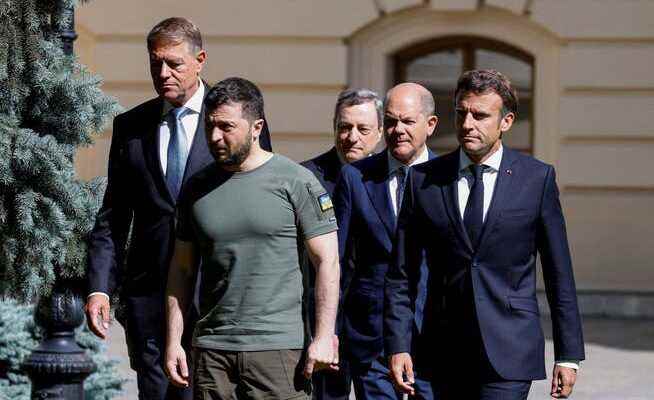It would not have stood a chance in peacetime, but now Ukraine has officially become a candidate for EU membership. Moldova has also received the coveted status.
Ukrainian President Zelensky accompanied by Romanian President Iohannis, Italian Prime Minister Draghi, German Chancellor Scholz and French President Macron.
The European Union has officially admitted Ukraine to the group of candidate countries. In addition, Chancellor Olaf Scholz (SPD) and his colleagues decided at an EU summit on Thursday to also grant Moldova the status of a candidate country, as Council President Charles Michel announced. The Belgian spoke of a “historic moment”. EU Commission President Ursula von der Leyen commented: “Today is a good day for Europe.”
On Thursday afternoon, the EU Parliament had already spoken out in favor of Ukraine and Moldova being given official candidate status for EU accession. At the meeting in Brussels, 529 MPs voted for a corresponding resolution. 45 MPs voted against.
With this step, the EU recognizes the efforts of the two countries to gain accession to the EU and wants to encourage them to continue on this path with determination.
Were there any prior concerns about Ukraine’s candidate status?
Yes. But since the European Commission recommended the status last week, opposition from skeptical member states like Denmark, Portugal and the Netherlands had melted.
German Chancellor Scholz and French President Macron, who have been putting the brakes on for a long time, also campaigned for accession during their visit to Kyiv last Thursday. An EU official said on Wednesday no country was against it yet.
The heads of state and government know that the step is only symbolic and that Ukraine still has a lot to do before the actual negotiations can begin. Otherwise they would hardly have signaled approval. The idea is that by being granted candidate status, war-torn Ukrainians should be able to draw hope.
So will Ukraine soon join the EU as number 28?
In truth, nobody knows at this point in time whether the largest country in Europe in terms of area will ever join the EU. The recognition of candidate status is only the first hurdle, while the actual process can drag on for years or even decades. The most striking example of this is Turkey, which was granted status in 1999 but only began accession negotiations with Brussels five years later – and is now further than ever from membership.
How does Ukraine go from candidate to member?
Now that Ukraine is a candidate for accession, the EU Commission will examine in annual stages whether the country is actually making progress with reforms. If this is the case, it can make a recommendation for the opening of accession negotiations. After that, all EU countries would have to agree again. And only then will the so-called accession chapters be opened: in 35 chapters on areas such as economic policy, the rule of law, the environment and science, the country has to prove that it has successfully adopted EU standards.
Can the EU even afford Ukraine?
Ukraine is a country that, economically speaking, would turn the EU upside down if it were a member. It has an agricultural area that is larger than Germany. Accordingly, the traditionally largest budget item in the EU, agricultural subsidies, would be completely muddled.
The country is also significantly poorer than the poorest EU country, Bulgaria. According to the previous logic, large sums would also be due for the cohesion payments. In addition, the war is still raging and there is no telling how much damage Russia will cause.
The only thing that is clear is that the trend is going in the wrong direction: Ukraine will become even poorer, the infrastructure is crumbling, and many people will have to leave the country. Even in peacetime, Ukraine’s admission would be a financially Herculean task. All of this leaves only one conclusion: if the EU actually wants to take in Ukraine one day, it will not only have to spend a lot of money, but also fundamentally change.
And what about the other candidate countries?
In addition to Ukraine and Moldova, there are five other countries in the Western Balkans and on Europe’s periphery that have been official candidate countries for many years (Albania, Montenegro, North Macedonia, Serbia, Turkey), and two countries that have been identified as “potential candidates”. apply (Bosnia-Herzegovina, Kosovo). It is expected that, alongside Ukraine, Moldova could also move to the first division, but Georgia will have to be patient.
Will there soon be an “anteroom” to the EU – also for Switzerland?
Ukraine’s desire to join the EU has caught the union of states at a bad time. But in view of the passion and the bloody toll with which Ukraine is trying to evade the rule of Russian President Vladimir Putin and thus defending the values of freedom and progressiveness, which are also dear to the EU, candidate status is likely to be granted.
What happens then is still open. There is no consensus in the EU about the direction in which the entity should be developed. Countries like Germany and France want to make a federal state out of it, while the eastern members prefer an association of fatherlands.
In addition, Paris has long resisted expansion. You have to reform the EU first, said Macron. Accordingly, he launched the first ideas of a “European political union” – a kind of “antechamber” of the EU – which states such as Iceland, Great Britain or Turkey could also join.
According to Macron, this platform could be used to coordinate security or climate policy issues. This debate about new connection models should also be of interest to Switzerland. After all, the Swiss are not uninterested in new forms of collaboration with the EU.
